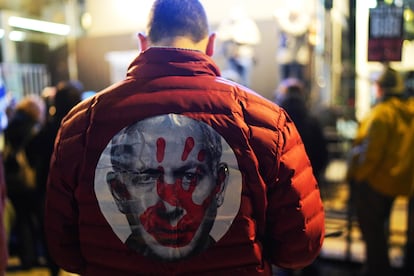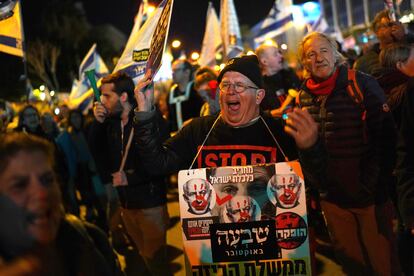Benjamin Netanyahu digs his heels in over a possible ceasefire in Gaza
Israel’s prime minister insists he will not accept a deal with Hamas ‘at any price’ as the Palestinian militia seeks prisoner releases and withdrawal of troops from the Strip

The demands being made by Israel and Hamas are complicating the ceasefire agreement that the mediating countries — the United States, Qatar, and Egypt — have been trying to reach for weeks. At this point, the differences between the two sides are insurmountable. Oblivious to internal and external pressures, from the families of the hostages or from his closest ally, Washington, Israeli Prime Minister Benjamin Netanyahu insisted Sunday that he will not accept an agreement at “any price.” He was referring, among other things, to the request to release thousands of Palestinian prisoners from Israeli jails, or to ease military pressure in Gaza. Meanwhile, Hamas has still not officially responded, although some media have stated it will not agree to a deal unless there is an end to military operations in the Strip and the withdrawal of Israeli troops from Gaza. This distancing of positions is driving the advance of the war in the Palestinian enclave, where more than 27,000 people have been killed and nearly two million displaced amid an almost total blockade on the entry of humanitarian aid.
Netanyahu stressed that his priority is to finish off Hamas, despite the fact that “efforts to free the hostages are continuing at all times,” according to statements provided by his office. The Israeli prime minister also reacted to comments and reports published about a possible agreement to bring about a cessation of hostilities. “We will not agree to every deal, and not at any price. Many things that are being said in the media, as if we had agreed to them, such as regarding the release of terrorists, we will simply not agree to them,” he added. The division is also evident within the ministerial cabinet where the hardline wing led by ultra-nationalists opposes any concessions to the people of Gaza, as opposed to the approach of centrists and some army generals, according to Reuters sources.
It has been a week since Paris hosted a high-level meeting at which Israel and the negotiating countries outlined a possible cessation of hostilities of between one and two months, which would open the door to a new exchange of hostages captured in the October 7 attacks for Palestinian prisoners. It would also facilitate a greater flow of humanitarian aid to Gaza. Hamas, which did not attend the meeting, has not responded to the plan.
The entrenched positions of both sides have prevented movement toward a ceasefire. Hamas demands the complete withdrawal of Israeli troops and the release of thousands of prisoners. Netanyahu, for his part, continues to insist that he will not give in to these demands and does not intend to withdraw the occupying troops, or to open the gates of his prisons on a massive scale. The level of demand for the exchanges, according to Israel, was set in the previous ceasefire agreement at the end of November, when the ratio was one hostage in the Strip for three Palestinian prisoners.
Hamas wants to bring the bar closer to the famous exchange, nearly two decades, ago of Israeli soldier Guilad Shalit, who was freed in exchange for over 1,100 Palestinians, including the current head of Hamas in Gaza, Yahya Sinwar. The name of the most famous Palestinian prisoner, Marwan Barguti, has come to the fore as one of the possible demands of the Islamist militia. A perennial candidate for president of the Palestinian National Authority, Barguti has been behind bars for over 20 years and is serving five life sentences.

Several thousand people again took to the streets in Tel Aviv in various rallies and marches on Saturday night to protest the government’s handling of the war. The families of the more than 100 hostages remaining in Gaza continue to demand that their release be a priority. Another group is calling directly for the prime minister to step down. Others, albeit in the fewest numbers, are demanding an end to the war and that the lives of Palestinians be taken into account, with the same value as those of Israelis.
Without directly addressing the protestors, Netanyahu took advantage of Sunday’s governmental meeting to underline, once again, his priorities. “I would like to clarify our policy: The essential goal is — first of all — to eliminate Hamas,” his office said. With a certain optimism, the president stated that 17 of the 24 battalions of the Izz ad-Din al-Qassam Brigades, Hamas’ armed wing, have already been wiped out. The remaining ones, he added, are in southern Gaza, including Rafah, the border area with Egypt where more than a million displaced people are crowded. Despite this, Netanyahu remains determined to extend his military operation there.
“Every airstrike in Gaza brings us closer to achieving our goals and returning the hostages,” said Israeli Defense Minister Yoav Gallant on a visit to a military base, as quoted by Haaretz. “The pressure on Hamas is working, they are in a very difficult situation and we are hitting them hard.” On Sunday, the army reported that they had raided the Khan Younis office of Mohamed Sinwar, brother of the Hamas leader, located in one of the places used to train those responsible for the October 7 attacks.
The military response to that attack has already killed more than 27,000 Palestinians in the Strip, the vast majority of them women and children, according to Hamas-controlled local government sources. Military aircraft from Jordan and the Netherlands dropped humanitarian aid from the air over the Palestinian enclave on Sunday, according to media in the Arab country.
Meanwhile, the United States continues to lead attacks against militia groups linked to Iran. After those carried out in Iraq and Syria over the weekend, the latest target has been the Houthi rebels in Yemen. Washington, which has not taken the step of directly attacking Iran, although it has targeted Tehran-backed militias, insists that this will not be the end to retaliatory strikes following the deaths of three U.S. military personnel in a drone attack in northern Jordan.
The Tehran-backed Houthis have been attacking maritime traffic in the Red Sea since last December, to show support for Gaza. On Sunday a Houthi spokesman, Mohamed Abdulsalam, said that they will continue with this strategy despite the attacks by the U.S. the U.K., and that the West will not find it easy to destroy their military capabilities, reports Reuters.
Sign up for our weekly newsletter to get more English-language news coverage from EL PAÍS USA Edition
Tu suscripción se está usando en otro dispositivo
¿Quieres añadir otro usuario a tu suscripción?
Si continúas leyendo en este dispositivo, no se podrá leer en el otro.
FlechaTu suscripción se está usando en otro dispositivo y solo puedes acceder a EL PAÍS desde un dispositivo a la vez.
Si quieres compartir tu cuenta, cambia tu suscripción a la modalidad Premium, así podrás añadir otro usuario. Cada uno accederá con su propia cuenta de email, lo que os permitirá personalizar vuestra experiencia en EL PAÍS.
¿Tienes una suscripción de empresa? Accede aquí para contratar más cuentas.
En el caso de no saber quién está usando tu cuenta, te recomendamos cambiar tu contraseña aquí.
Si decides continuar compartiendo tu cuenta, este mensaje se mostrará en tu dispositivo y en el de la otra persona que está usando tu cuenta de forma indefinida, afectando a tu experiencia de lectura. Puedes consultar aquí los términos y condiciones de la suscripción digital.









































